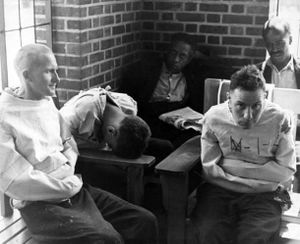Riverside Mist Asylum
|
|
Work in Progress!
This page is under construction Mortal. This is a elegant process and take time unless you help.
Help get the doctors and patients over to this wiki (See link) . |
| Riverside Mist Asylum | |
| Chief Psychiatrist: | Rostislav Woronoff |
| Address: | Temnyy gorod; Vodnie Vrata District 1:1 |
| Category: | Healthcare |
- Game article:
 Game Master
Game Master
The Riverside Mist Asylum is the largest mental institution in Tenevyye. The hospital handles patients that don't respond well to medical treatment with more experimental treatments and institutionalization.
Wards
- Daycare ward
- Clinic and early treatment ward
- Closed ward
- Criminal insane ward (High Security)
History
The Riverside Mist Asylum opened 1882 and was one of many asylums opend in russia during the time. Between the 1922-1980 when the region belonged to the Soveit Union the asylum was used for political reprograming of political opposition. During and after the first and second world war many Red Army soldiers mentaly scared and traumatized by the authorities they witnessed received treated at the asylum. In the 1970s and 1980s the introduction of modern psychotropics made it possible to close many asylums. Many asylums in the surrounding closed down and Riverside Mist Asylum asylum took over care for the patients that got transfered. Now the Riverside Mist Asylum is one of four mental asylums in Tenevyye.
Today the asylum is in the forefront of experimental and medical treatment in Tenevyye.
Noticeable Employees
Noticeable Patients
- Chaly Karl Andreevich, 80 years old - (Previews famous author)
The history of insane asylums
Asylum have always been the center for care for the mental ill for centuries trying and experimenting with different methods to cure the troubled mind of the patient. In the asylums experimental treatments were preformed on the patients in order to cure them. In the 1950s a miracle cure for the most troubled mind came to light developed by Walter Freeman the prefrontal lobotomy. The practice was largely practiced on patients until the introduction of modern psychotropic drugs in the 1970s were the numbers of lobotomy's declined and is now only used used for the most troubled. This also led to a decline in the numbers of insane asylums due to community care reforms and the possibility to treat mental conditions at home.


